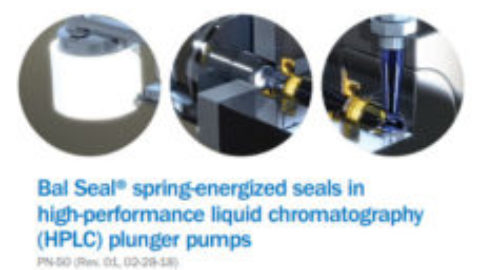The Bal Seal® spring-energized seal provides superior sealing performance in a range of pressures, temperatures, and media. This is ideal when designing a pump for clinical chemistry analyzers because it will prevent leaking and prolong service life.
Check out the infographic below to learn about potential issues you may face when designing a clinical chemistry analyzer and how to prevent them.


Clinical Chemistry Analyzer Complications
Clinical chemistry analyzers are involved in performing a wide variety of testing. For example, they can be used in analyzing blood, urine, and even genetics.
Their failure can cause inaccurate results, lab downtime, and lost profit. Therefore, it’s essential to be aware of potential complications and address them appropriately.
One major complication related to clinical chemistry analyzers is the formation of salt crystals. This occurs when seals aren’t optimized, which causes wear and leakage of the saline-based reagent.
In the following section, we’ll discuss design tips to provide superior protection against leakage and clinical analyzer breakdown.
Design Tips for Successful Chemistry Analyzer Sealing
To minimize the risk of leaking and prolong the life of your clinical analyzer, it’s essential to optimize the design of your seal.
Some important factors to keep in mind when designing an effective seal for a clinical analyzer include:
- Polymer backup to reduce extrusion, tighten tolerances, and prevent misalignment
- Lip geometry that will prevent leaks
- Bio-inert energizer with low friction
- FDA compliant seal jacket with low particle generation to minimize contamination
Additionally, tightening housing tolerances and reducing piston misalignment can also help protect against leakage.
Optimize Seal Design with Bal Seal Engineering
If you’re interested in getting more performance and service life out of your clinical analyzer, the sealing experts at Bal Seal Engineering can help!
Click here to submit a design request form and elevate your new or existing seal design.











